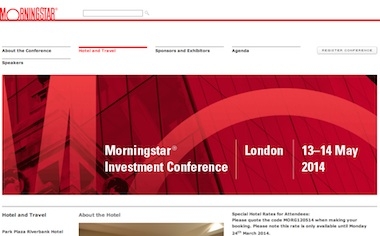A panel discussing the Future of Advice at the Morningstar Investment Conference heard that a consumer survey for the session found a 'lack of trust' as a key reason consumers avoided using a financial adviser.
The survey was conducted by Morningstar to learn more about consumer attitudes to financial advisers and financial services.
The panel, chaired by Holly Cook, editor of Morningstar.co.uk, included Nick Bamford, executive director of Informed Choice, Jonathan Eley, personal finance editor of the Financial Times and Charlie Nicholls of investment website MoneyonToast.
The survey found that the most important factor when choosing an adviser was trust. Ms Cook said that lack of trust was reported as a primary reason in the survey for consumers choosing not to go to an adviser.
When asked what the main reason was for not wanting to use a financial adviser, the top reasons were 'I prefer to be in control' (29 per cent), 'I can do a better job myself' (22%) and 'I don't trust the financial services industry' (19%).
When asked what clients expect to get when paying for advice the top response was 'Better investment returns' (46%). Next was 'Peace of Mind' (29%) and third was 'More time to focus on other things' (25%).
The panel agreed that seeing an adviser was generally a good thing but there were issues about the affordability of advice and the ability to meet future demand.
Charlie Nicholls of MoneyonToast said his firm offered "advice by algorithm" with the aim of reaching large numbers of consumers.
He believed there was room in the market for both financial advisers and online services in the future.
Jonathan Eley, personal finance editor of the Financial Times, said his readers mainly preferred a thoughtful, traditional approach to advice but he said there had to be an "evolution" of the traditional IFA to fit the demands of the modern world.
He said too many traditional IFAs spent a lot of time on the road and only saw two to three clients a day.
"There needs to be a different use of time and technology and pricing models," he said.
• The session was followed by a separate panel debate on The Advice Gap chaired by Mark Polson of the LangCat. The panel included Laurie Edmans, trustee at the Money Advice Service, Nick Hungerford, CEO at online fund service Nutmeg and Chris Williams, board member of the IFP and founder of the newly-announced online advice service WealthHorizon.
Mr Williams said the advice gap should only be filled by properly regulated advisers.
"You get better outcomes from appropriately regulated advisers," he said.
{desktop}{/desktop}{mobile}{/mobile}
He said however that there were an estimated 10m individuals with portfolios of between £10,000 and £150,000 and many could not afford an adviser so new methods of serving them had to be found by advisory firms otherwise new entrants would take this market.
Mr Edmans said despite criticism of the Money Advice Service it provided help and advice to millions of people, much of it around debt problems.
A survey during the session found that many delegates believed technology could deliver some financial services such as protection insurance but only 8.5 % believed that estate planning could be done entirely online.
The panel debates took place at the 2014 Morningstar Investment Conference in London for more than 400 attendees. The conference is supported by the Institute of Financial Planning. The two day event is taking place at the Park Plaza Riverbank Hotel in London today and tomorrow.

